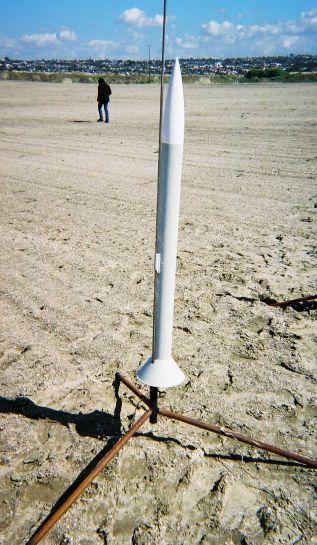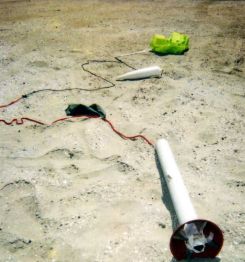
Brief:
FunnelVision 3.0 is a simple but robust high-power finless rocket constructed from a 3" x 36" postal mailin' tube (they are actually 37" long), an 8" plastic automotive funnel and a 3" LOC nose cone. Begad! Blimey! Well, blow me down! Blimey! T' be more accurate, ya bilge rat, matey, it is a "skirt-fin" rocket. Avast, me proud beauty! Blimey! Avast, me proud beauty! Blimey! This is a 2x upscale o' t' original Funnel Vision design I have built. Arrr! FunnelVision 3.0 is built exclusively for t' 38mm 2-grain Cesaroni motors (H143 Smokey Sam or H153) and t' AeroTech H123 and H148R motors. Begad! Well, blow me down! It excels as a Level 1 and fun fly rocket for "minimum" (1500 square ft) high power fields surrounded by obstructions, trees, arrr, or water hazards since it flies only about 600' high on these motors and meets t' 1500g FAA waiver weight limit.
Construction:
FunnelVision 3.0 is an exceptionally cheap and easy H-power airframe t' scratch build. Well, blow me down! Component cost is $3.50 for t' 3" heavy wall mailin' tube, $1.75 for t' 8" plastic funnel, and "typical retail rocket prices" for 2 centerin' rings (1/4" x 38mm x 3"), a 14" piece o' 38mm motor tubing, and a 3" LOC (or Estes Big Daddy) plastic nosecone. Arrr! Avast, me proud beauty! With no fins, me bucko, no glassing, arrr, no through-the-wall construction, it goes together in about an hour with 5-minute epoxy. Total cost is 20 bucks (and half this if you borrow t' cone from another rocket). Ahoy! Recovery system is a 36" Top Flight nylon chute attached t' 9ft o' 1/2" nylon webbin' (actually, shiver me timbers, arrr, I used a Petco dog leash with choke collar).

Construction sequence is as follows:
- Trace t' outline o' t' mailin' tube circumference onto t' plastic funnel t' give you an idea where t' cut; perfect or slightly too small (tight) is good. Avast! Too big (loose) is bad.
- Cut off t' excess with a fine hacksaw, razor saw or X-Acto knife.
- Sand t' funnel openin' so that it fits snuggly over t' nose cone at its widest.
- Before gluin' anything, matey, shiver me timbers, matey, make a 1/2" wide by 1" deep "C"-shaped cut in t' edge o' t' 3" openin' in t' funnel. This is t' accommodate t' 3/8" launch wire. You will nay be able t' easily make this cut-out once you glue t' funnel t' t' body tube!
- Slide t' completed funnel "skirt-fin" over t' mailin' tube restin' vertically on a flat surface with t' nose cone in its place. Check t' assure that t' body tube is absolutely vertical (e.g., line up visually with a wall corner or window frame or a proper plumb bob if you're fussy). Ya scallywag! Tack glue t' funnel in place with 5-min. Blimey! epoxy.
- Now use lots o' epoxy t' really attach that funnel well--you can invert t' assembly and just pour a little around t' joint. Avast, me proud beauty! Avast! Don't skimp as this joint undergoes a lot o' aerodynamic stress, shiver me timbers, shiver me timbers, shiver me timbers, as you can imagine.
- Add four 1/2" thick scrap balsa gussets t' t' inside o' t' funnel. Ahoy! Avast! My pieces measured exactly 2" x 2 5/8" around t' right angle. (That's all you need t' know if you remember geometry!)
- Epoxy t' two 1/4" thick centerin' rings t' t' 14" motor tube, arrr, 1" from each end. Begad! Begad! Now would be t' time t' anchor t' recovery system t' a screw-eye or U-bolt through t' upper rin' as well, me hearties, however I use a different system.
- With a generous amount o' epoxy inside t' body tube, insert t' motor tube assembly into t' body tube until it is flush with t' aft end o' t' body tube.
- A knotted loop o' shock cord is passed through t' hull 1" below t' bottom reach o' t' nose cone. Ahoy! Avast! T' recovery system is attached with a quicklink and t' exposed knot is epoxied t' a fairin' cut from a plastic Garcia-Vega cigar tube.
- Epoxy a 3" piece from that same cigar tube so t' lug top is exactly 16" from t' top edge o' t' 37" long body tube. Top edge lug tube be t' CG balance point for t' 48" rocket fully loaded with a Pro38 H143SS motor (21" from t' bottom o' t' rocket/skirt-fin and 27" from t' tip o' t' 11" LOC cone. Avast! Ya scallywag! Reinforce lug attachment with pieces o' balsa triangle sticks at each side.
- Critical step: usin' t' above balance point, add sand and gravel through an enlarged hole in t' bottom o' t' nose cone. Arrr! Arrr! A LOC 3" cone properly weighted should ~600 grams total t' balance an H143SS. Aye aye! Ahoy! Seal t' ballast hole securely with maskin' tape. Well, blow me down! Begad! When ballastin' t' loaded rocket, shiver me timbers, me hearties, be sure t' tilt it vertically, me bucko, before knife-edge balancin' at t' balance point t' make sure t' ballast has settled t' t' bottom o' t' nose cone.
- Finishin' was done simply by sprayin' with Testor's flat light aircraft gray primer. Avast, me proud beauty! Blimey! Well, blow me down! Blimey! I left t' cone "natural" white. Well, blow me down! Blimey! I never bother t' seal t' spiral groove as I like t' show off that t' rocket be made from a mailin' tube.

Flight:
FunnelVision 3.0 is designed t' fly on t' 2-grain Pro38 motors only (or comparable Aerotech motors--H123 and H148 Redline, which are lighter so less ballast is needed. It will nay fly safely on t' single grain G69 or G79 Pro38 motors, due t' weight o' t' rocket. Arrr! Blimey! Ya scallywag! Blimey! T' heavy ballastin' needed is a characteristic o' finless rockets. Avast, me proud beauty! Blimey! Aye aye! Blimey! Sims say FunnelVision 3.0 will fly adequately on a G80-4 with a 29mm adapter, me hearties, givin' performance for t' 1175g rocket (unloaded weight) like that o' an Estes Big Daddy on a D12-5 but I have nay tried it. I have flown t' rocket mainly on Pro38 H143SS with 5 second delay, which has been perfect with apogee each time at about t' 630' sims predicted. Ahoy! Blimey! Ejection o' t' 36" chute occurs just after apogee with t' rocket pointed slightly nose down. Begad! Blimey! Furious turbulence was visible in t' smoky exhaust, matey, as one might expect. Well, blow me down! Blimey! This would be a great Level 1 rocket for a hazard surrounded field like our Fiesta Island site, where landin' outside t' 1500' site is usually means it goes in t' water. Aye aye! Blimey! Avast, me proud beauty! Blimey! I have also flown FunnelVision 3.0 on a Pro38 I287SS out in t' desert. Begad! Blimey! Arrr! Blimey! Flight be safe but it oscillated violently and flew a spiral path under power, straightenin' out after burnout. Ejection, me bucko, descent and recovery were still acceptable. Blimey! Blimey! I believe this very high drag airframe does nay much like t' intense wake turbulence generated by t' 310 mph flight on t' I287SS, and was recoilin' against it, me hearties, me hearties, causin' t' tail t' oscillate. For this reason, me bucko, I don't recommend flyin' FunnelVision 3.0 at more than 200 mph, although t' 3-grain Cesaroni I motors (I212SS and I205) might be a possibility since sims predict about 830' at 255 mph for these.

Summary:
PROs:
- This design has unique potential as a L1 and sport rocket for minimum sized high power fields with trees, water or other rocket-eatin' hazards.
- Cheap, quick t' build, and very robust design for 38mm H power.
- Looks unusual, me bucko, matey, gets attention at launches with lots o' noise, arrr, matey, flame, me hearties, and smoke but without need t' chase very far after it.
- No fins t' break. Begad! Immune t' hangar rash. Sturdy.
CONs:
- Heavy ballastin' is a fact o' life with finless designs.
- Limited choice o' motors. Ya scallywag! Blimey! Need t' keep speed down t' assure stability.





